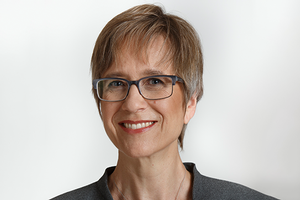Achievements
Seeking Continuity in Crisis, SPA Pivots Online

When the Covid-19 outbreak response prompted American University to move to online classes as of March 18, Dr. Sonja Walti, Director of Online Programs at the School of Public Affairs (SPA), helped the school’s faculty transition. Walti, an assistant professor in the Department of Public Administration and Policy, also heads SPA’s online Master of Public Administration and Policy (MPAP) program.
“We had one week of lead time to support faculty in this transition,” said Walti. "Our faculty have varying levels of online proficiency; some had taught online courses in the MPAP and the online Master of Science in Counterterrorism and Homeland Security programs for years, and others had never developed online content at all."
The successful MPAP program, launched in 2014 and boasting upwards of 130 graduates, is managed on a platform called Engage, with the help of an external digital provider. For these programs, developing built-in online content means extensive shepherding by professional instructional designers and media specialists over months, along with thorough training for faculty and students. SPA’s mid-semester transition called for a different approach.
With this level of support and planning unavailable, Walti helped implement SPA’s own online transition system. With many instructors teaching multiple courses, and an implementation timeline of a few days, one-on-one coaching was impossible. In the face of this challenge, SPA used a survey to prioritize coaching needs and created a “buddy system,” matching faculty with online teaching proficiency with those requiring more support. She monitored online course building efforts and developed a tracking system devoted to identifying “blind spots,” or areas in which either faculty were slow to create content or students were failing to interact.
The comfort of the students, Walti said, is a top priority for SPA. “Many students returned to home countries in nations of crisis. Many are already struggling with illnesses of their own, or those of family members. Internet access may be unreliable, or their home-learning situation could be difficult in ways that we could never anticipate.” She and her team of “buddies” encourage faculty to solicit and accept feedback from students as the online learning process unfolds, and to respond to that feedback in whatever ways are possible and appropriate. Faculty can inject relevance and understanding by sharing their own vulnerability, connecting via Twitter and other platforms, and injecting humor and understanding.
Based on a faculty’s approach to teaching and comfort-level with online tools, Walti would advise a mix of three simple strategies: recording lectures, live meetings, and discussion boards. While recorded lectures help students follow content better, live meetings require less technical familiarity, Walti says. While live meetings allow for a rapid exchange, discussion boards offer a failsafe way for all students to contribute. While discussion boards offer everyone a platform to contribute, live exchanges give students reassurance. AU’s online learning platform Blackboard allows for all of this and more. Based on these three simple strategies, Walti was convinced, “even faculty with little to no experience teaching online could pivot quickly without compromising their course content nor teaching style.” Indeed, even faculty completely new to online engagement quickly went above and beyond, exploring tools, trying different solutions, following up with questions.
When asked for examples of professors exhibiting best practices and meeting this challenge with heart, Walti had a ready list. “Dr. [Kevin] Boyle, who has a military background, saw this as problem to be solved, saying ‘Let me save everybody!’”
“Dr. Barbara Romzek, who was initially reluctant [to move online], won’t compromise her commitment to students nor to the depths of discussion,” she added. Romzek, a professor in Public Administration and Policy, is determined to find low-tech solutions to fully engage her students with heart and creativity, Walti said.
Dr. Lara Schwartz also stands out. The highly popular professor in the Department of Government “invites her students to help build course content and engagement” in a way that builds an interactive learning community, liveliness, and fairness.
In the Department of Justice, Law, and Criminology, Dr. Joe Young and Dr. Jane Palmer, both well-versed in digital instruction, serve as “buddies” to other SPA faculty while managing their own online course load with creativity and aplomb.
Walti’s commitment to digital instruction extends throughout her life. When instructors (or others) email her with digital learning questions, she holds the line.
“Just sent you an invite to my Zoom room,” she says. “Let’s do that.”